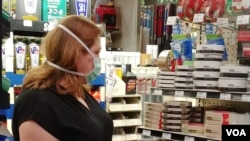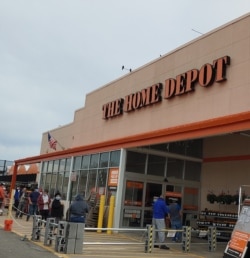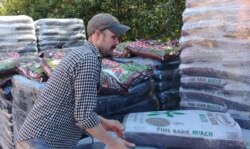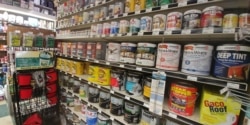Wearing a surgical mask and gloves to protect herself from the coronavirus, Dr. Susan Buenaventura checks out the painting supplies at the Village Hardware store in Alexandria, Virginia, outside Washington.
She is a physician who performs elective surgeries at a nearby hospital. But with nonessential health care delayed because of COVID-19, Buenaventura has some time on her hands, so she and her husband are doing a bit of indoor house painting.
To help control the spread of the virus in the United States, many businesses have been closed, except those considered essential, which often include hardware stores to help with urgent home or building repairs. But many of those customers are buying supplies for do-it-yourself home improvement projects that can wait.
Stay-at-home orders requiring people to remain at home, except for getting necessary items such as groceries and medical prescriptions, have been mandated by the state of Virginia, along with more than 40 other states, and the District of Columbia.
Buenaventura acknowledged that for safety, “it is better the less we go out, and we go out just when we need to.” But, she added, “it’s a different mindset, I think, when people are home and there’s projects they want to tackle.”
Erin Westgate, an assistant professor of psychology at the University of Florida, has done a study on boredom. She said even when people know they shouldn’t go out because of the pandemic, “if they don’t have something to do, they look for something else to do. I think what happens is you have all this time to fill, and you’ve lost your routines and goals and things that give you purpose each day.”
Business has almost doubled from this time last year at Village Hardware, store manager Tyler Gray said, with customers buying paint to spruce up the house, or purchasing garden mulch as the spring temperatures rise.
“We’re also selling a lot of lawn mowers and barbecue grills,” he said, “because no one can go inside restaurants to eat right now.”
Gray said many customers are ordering over the phone for neighborhood deliveries or curbside pickup, instead of coming into the small store with narrow aisles that make it difficult to maintain social distancing.
Anthony Calandra stopped by to get a few things to fix his wife’s bicycle. He doesn’t worry about getting the virus.
“I trust that if people are sick, they’re not going out and about,” he said, but he acknowledges he wouldn’t be able to tell if people were ill since many of them don’t show symptoms.
At Brown’s Hardware in Falls Church, Virginia, owner John Taylor said customers are looking for cleaning supplies, which are hard to keep in stock since people are hoarding them.
“They’re buying up all the batteries, too,” he said.
And at Cherrydale Hardware in Arlington, Virginia, manager Jacob Proxima said the shop is already out of flower and vegetable seeds, and he won’t be able to get any more during the growing season.
Taylor said despite the purchase of nonessential items at “essential” hardware stores, “you can’t really tell customers what they can or cannot buy,” particularly since some of those things may be used for an emergency, such as plumbing or electrical repairs.
In an email statement to VOA, Lowe’s, the second-largest hardware retailer in the U.S. and worldwide, pointed out that some people are “coming to us for help with urgent home repairs, refrigerators and freezers, so they can keep food and medicine from spoiling.”
While Village Hardware customer Ed Hartman appreciates that the hardware stores are open, he warns people to think twice before venturing out of the house.
“I think I got COVID-19 last month before a quarantine was in place,” he said. “I had a bad headache and cough and no appetite. I have no idea how I got it, and this was much worse than the flu and knocked me out for a week.”







